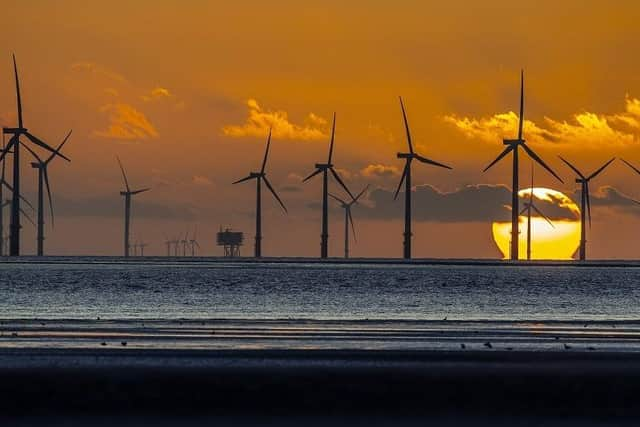Cost-of-living crisis: Concerns grow over energy supplies despite National Grid cancelling emergency power scheme
The National Grid Electricity System Operator (ESO) announced on Monday morning that it may be issuing a “service requirement” for what it is known as its Demand Flexibility Service (DFS), an emergency initiative that incentivises households to cut their peak-time use to help avoid power cuts and reduce strain on the grid.
Customers with smart meters installed who have signed up to the scheme via eligible suppliers, such as British Gas and Octopus, are able to to receive discounts on the their bills if they use less electricity in an allocated time period.
Advertisement
Hide AdAdvertisement
Hide AdBut by 2:30pm, the ESO said there was “no longer considered to be a requirement” for the contingency scheme to commence, as had been initially proposed. It said to manage margins on the electricity system, it used “routine tools”, adding: “We are confident that these tools will allow us to manage margins and demand is not at risk.”
Had it gone ahead with the DFS scheme on Tuesday evening, those customers taking part – households as well as businesses – would have been been asked to reduce their power usage by, for example, not turning on washing machines or tumble dryers, or using microwaves to cook meals instead of ovens. The service has been tested twice in recent weeks, with some households earning more than £4 for taking part over the course of an hour.
However, the fact the initial announcement was made at all was the first confirmation the ESO is prepared to implement the scheme to deal with the prospect of peak evening demand exceeding supply during the winter.
It comes as the firm issued and then rapidly cancelled a notice that the difference between the amount of electricity available and the actual supply of electricity would be smaller than hoped for on Monday evening. The so-called Capacity Market Notice (CMN) was issued at 1:33pm, with a warning of a tight grid at 6pm. The notice was cancelled again at 2:04pm. The alerts are sent out automatically when expected margins drop below a certain level.
In the past six years there have been 12 such CMNs, all of which have been cancelled without incident. CMNs do not necessarily mean that blackouts are likely. However, the notices have become more common this year as Europe goes through an energy crisis intensified by the war in Ukraine.


The UK's power grid usually relies on imports from France over the winter months to make up any shortfalls in electricity output. However, the French nuclear power industry, which accounts for around 75 per cent of its usual electricity generation, is encountering severe problems, with more than half of the reactors run by state energy firm EDF closed due to maintenance and technical problems.
Low wind speeds have also affected the UK’s ability to produce electricity through offshore wind developments, some 60 per cent of which are sited in Scotland. Up-to-the-minute data from the National Grid at 4pm Monday showed just 3.6 per cent of Britain’s electricity generation was coming from wind power. The vast majority – some 59 per cent – was coming from gas-fired power plants. In the last quarter of 2021, wind power contributed 26.1 per cent of the UK's total electricity generation.
In a statement, EnergyAppSys, a firm that helps traders and energy analysts to make decisions around the energy markets, said: “Even though wind is coming back for tomorrow evening's peak, slow return of nukes in France plus lower temperatures may mean that there is a reduction in available imports across the interconnectors.”
Advertisement
Hide AdAdvertisement
Hide AdMillions of people around the country will be settling in to watch England play Wales at 7pm on Tuesday in the teams' final game in the group stages of the World Cup.
So far Octopus Energy is by far the most active energy supplier in the Demand Flexibility Service. It released data showing its customers had helped reduce demand by more than 100 megawatts during both tests. That is the same amount of electricity that a small power plant produces.
Octopus said some of its customers had earned more than £4 during the hour-long sessions. The average saving was "well over £1”, it added.
The scheme is administered by energy suppliers. Households have to register their interest in taking part in advance. They will then get a text or other message saying the programme will run later in the day.
If they use less electricity than they normally do during the allotted hours, they will be paid for the savings. The customers will not be punished if they decide to keep using electricity as normal.
So far, only a limited number of suppliers are taking part, but National Grid hopes participation will increase in the weeks ahead. Those providers signed up also include E.ON Next, Shell Energy Retail, Carbon Laces, Equiwatt, and EV Energy.
Last month, the National Grid warned a combination of events, such as Russia cutting gas supplies to Europe and a cold snap, could lead to three-hour power cuts. The ESO has said that such a scenario was “unlikely”.
Comments
Want to join the conversation? Please or to comment on this article.